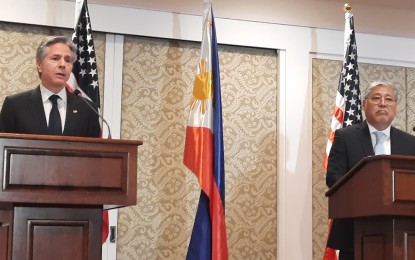
IMPROVED COOPERATION. US State Secretary Antony Blinken (left) and Foreign Affairs Secretary Enrique Manalo (right) speak to foreign and local media after their bilateral meeting at Sofitel Manila on Tuesday (March 19, 2024). Manalo said an improved cooperation with Washington DC is vital for the Philippines to build its capacity not only for maritime but also on humanitarian operations. (PNA photo by Joyce Rocamora)
MANILA – The Philippines and the United States’ steadily growing security ties are "not targeted" against any country, the two states’ top diplomats said Tuesday amid China’s accusation that the US is using the country as a “pawn to destabilize” the South China Sea.
On numerous occasions, the US has reiterated its “ironclad commitment” to its alliance with Manila in the face of Beijing’s actions in the West Philippine Sea.
During his visit to Manila on March 19, State Secretary Antony Blinken reaffirmed this and said the US will continue to bolster its maritime, defense, as well as economic cooperation with Manila.
He explained that Washington DC’s foreign policy is to reinvigorate existing partnerships in the region and “build nuance that are fit” for the needs of its partner country.
“None of these are directed against anyone or anything, they're in service of something -- they're for trying to realize the positive vision that all of the countries involved share a free and open Indo-Pacific,” he said in a joint press conference at Sofitel Manila on Tuesday when asked to deny China’s claim that the US is “encircling China” and using Manila as a pawn.
The US top diplomat added this also applies to the improving trilateral cooperation between the Philippines, Japan and the US.
Manalo echoed this, noting an improved cooperation with Washington DC is vital for the Philippines to build its capacity not only for maritime but also on humanitarian operations.
“And that is the main purpose behind this --to enhance Philippine defense and security interests as well as operations on humanitarian issues,” he said.
“They are not aimed at any third country and they are specifically in accordance with our interest and needs. So that is the main aim and, in fact, the only aim of these activities,” he added.
The Chinese Foreign Ministry had earlier issued a statement urging Washington DC not to “hurt China's sovereignty and maritime interests” in the South China Sea in its promise to defend the country.
Beijing had also previously criticized the expansion of sites under the two states’ Enhanced Defense Cooperation Agreement (EDCA), saying it would “damage” the country’s economic development at the end of the day.
Blinken, for his part, said the EDCA expansion is strengthening its cooperation with Manila further as it brings “important benefits for local communities” while creating new locations for access to jointly work together on humanitarian assistance and disaster relief, among others.
Last March 15, Defense Assistant Secretary for Logistics, Acquisition, and Self-Reliant Defense Posture Joselito Ramos and US Assistant Secretary of Defense for Acquisition and Sustainment Christopher Lowman also met and reaffirmed commitment to addressing the capability gaps of the EDCA sites.
Economic resilience
On top of defense and security engagements, the two foreign ministers also discussed further expansion of economic relations, including on semiconductors.
“The Philippines has about 20 percent of the global market for assembly, for testing, for packaging and of course, it's a big part of the Philippines’ economy representing about 12 (percent) of its GDP (gross domestic product),” Blinken said.
“But we want to support Filipino manufacturing, decrease dependencies, strengthen global supply chains,” he added.
The Philippines and the US are also assessing additional priority areas for investment, specifically on clean energy, transportation, logistics, and warehousing to increase food security, he said.
“It's a partnership that is growing day by day in a variety of other areas as well as from cyberspace to artificial intelligence to clean energy to critical minerals to outer space,” Blinken said.
Manalo and Blinken’s meeting comes as the two states prepare for a trilateral leaders’ summit between President Ferdinand Marcos Jr., US President Joe Biden and Japanese Prime Minister Fumio Kishida on April 11. (PNA)
